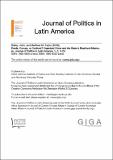| dc.description.abstract |
Government and organized criminal groups co-exist in uneasy equilibrium. Criminal groups adjust their behavior as a function of their own goals and resources in relation to inter-group cooperation and conflict, dy- namic markets, and public policies; governments adjust their behavior ac- cording to shifting perceptions of the benefits offered, threats posed, and strategies adopted by criminal groups. When governments attempt to con- trol or repress their activities, criminal groups employ various tools and instruments that might be grouped into three categories: evasion, corrup- tion, and confrontation. The paper draws on recent cases from Brazil and Mexico with respect to tactical and strategic choices by governments and criminal groups, seeking to address three broad questions. What factors disrupt the state-criminal group equilibrium? Under what circumstances do disruptions produce significant levels of violence (as opposed to evasion or corruption)? What are the implications for the quality of democracy as criminal groups violently confront the state? |

